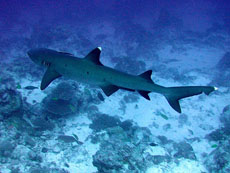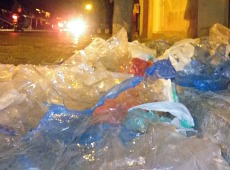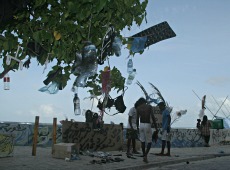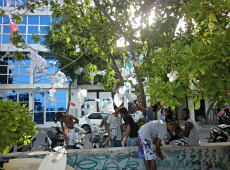A dolphin with a puncture wound to the head was found dead and stranded on Hoadedhdhoo Island in Gaafu Dhaalu Atoll yesterday morning (July 17).
In the early morning hours of Tuesday a Hoadedhdhoo resident discovered the dead dolphin on the west side of the island – which faces away from the interior of the atoll towards the open sea.
The dolphin showed no signs of life, but had sustained a visible puncture wound which was bleeding onto the hard, flat coral that surrounds the island like a buffer.
“I think fishing boat people injured it because its head was bleeding. The dolphin looked like its head had a puncture from a fishing hook,” a Hoadedhdhoo government official told Minivan News today (July 17) on condition of anonymity.
This incident could be a potential issue for the Maldives’ fishing industry, which is known for its environmentally sustainable pole and line method, where no nets are allowed, preventing bycatch which makes it ‘dolphin safe’.
The source said he believed the dolphin must have died recently because there was no foul odor coming from the body at the time it was discovered.
A white object in the dolphin’s mouth was a piece of coral probably put there by small children that had been playing near the body, the source explained.
The source noted that “not a lot” of fishing boats are seen off the coast of Hoadedhdhoo. However, large pods of dolphins have been observed in the channel slightly north of Hoadedhdhoo.
About five or six years ago a small dolphin was found dead on the same side of the island, however it did not appear to have sustained any injuries, another Hoadedhdhoo resident told Minivan News on condition of anonymity.
Dolphins essential for Maldives’ ecosystem
Following the reported incident, Minivan News contacted the Maldives Marine Research Centre (MRC) to determine the species and age of the dead dolphin.
“From the characteristics of its body shape and erect dorsal fin, it appears to be a common spinner dolphin (Stenella longirostris). They can be easily identified by a long slender beak with a black tip and black lips, while their bodies are mainly grey with three toned coloration,” MRC Assistant Research Officer Mariam Shidha told Minivan News today.
While it was difficult to determine the exact size of the deceased dolphin based on the photographs, it is “most likely to be an adult”, since adults range between 1.8 – 2.1 meters in size, while they mature at the size of 1.5 – 1.7 meters, explained Shidha.
 “Dolphins are important to our ecosystem because they are apex (top level) predators which control the populations of fishes and squids to keep it all balanced,” Shidha emphasised.
“Dolphins are important to our ecosystem because they are apex (top level) predators which control the populations of fishes and squids to keep it all balanced,” Shidha emphasised.
She explained that stranding of cetacean species – a such as whales, dolphins, and porpoises – “do not happen that often” in Maldivian waters; at most two to three per year are reported.
“[Moreover,] in the Maldives its a very rare thing for a dolphin to be injured by a fishermen since they are not a bycatch of pole and line fisheries,” she said. “However, in the Pacific Ocean, fishermen sometimes purposefully catch dolphins as they use other [unsustainable] fishing methods in order to get to the yellowfin tunas that swim underneath dolphins.”
“The MRC has had no reports of such deliberate acts of abuse or harm to dolphins [in the Maldives],” said Shidha. However, any incidents of people harming dolphins or strandings should be reported to the MRC.
All dolphins and whales are protected under the Maldivian Law and almost all the species of dolphins found in Maldivian waters are listed in the IUCN’s red list of threatened species, noted Shidha.
The MRC is working to raise awareness about why dolphins are essential for the environment in the Maldives.
“We are educating the public on the importance of protecting these charismatic fauna which are so important for the functioning of the ecosystem,” emphasised Shidha. “Also we have held a Cetacean Symposium and outreach programs for school children.”
Fisheries Ministry
“When we find a [stranded] dolphin it’s important to know how it happened. However, I don’t know how we can investigate [in this case],” Minister of Fisheries and Agriculture Ahmed Shafeeu told Minivan News today.
“The type of pole and line fishing we have [in the Maldives] is done in a way that doesn’t harm dolphins,” said Shafeeu. “We have not had reports of dolphins being caught, it’s very unlikely.”
said Shafeeu. “We have not had reports of dolphins being caught, it’s very unlikely.”
“Although an accident or something can happen, in that case the dolphin should be released immediately,” he emphasised. “Catching dolphins in any way [intentional or unintentional] is not allowed by law.”
“Sometimes dolphins are found washed up on the shore [of an island]. In those cases the incident should be reported to the local island council,” explained Shafeeu. “[But] there is no specific regulation that requires island councils to report to national offices if an animal is found.”
“However, if there are concerns of malpractice or someone is known to be deliberately hurting an animal, then it should be reported [to the relevant authorities beyond the island level],” he added.
‘Dolphin safe’
Environmentally-friendly, sustainable pole and line fishing allows Maldives’ tuna to be certified as ‘dolphin safe’, enabling it to be sold as a “premium” product for the European and US markets.
The ‘dolphin safe’ certification is provided by the Earth Island Institute (EII), an international non-governmental organisation (NGO).
Earlier this year EII Associate Director Mark Berman explained to Minivan News that EII’s ‘dolphin safe’ policy requires that “no tuna company will deal in sea turtles, sharks, dolphins, whales, or their products. All efforts to minimise bycatch of these species is mandatory”.
A November 3, 2011 EII press statement read, “the Maldives tuna industry has adopted a policy to ensure that no dolphins are ever killed in tuna nets.”
“That Dolphin Safe standard is respected all over the world”, Dolphin Safe program Associate Director Mark Berman told Minivan News at the time. “Major tuna importing nations will not buy tuna from governments that harm dolphins.”
According to the EII website, the companies licensed with the dolphin-safe label must meet the following criteria:
- No intentional chasing, netting or encirclement of dolphins during an entire tuna fishing trip;
- No use of drift gill nets to catch tuna;
- No accidental killing or serious injury to any dolphins during net sets;
- No mixing of dolphin-safe and dolphin-deadly tuna in individual boat wells (for accidental kill of dolphins), or in processing or storage facilities;
- Each trip in the Eastern Tropical Pacific Ocean (ETP) by vessels 400 gross tons and above must have an independent observer on board attesting to the compliance with points (1) through (4) above
 Reefs have been “heavily modified” over the past 30 years – due to the lack of “concurrent precautionary management” – as “resource exploitation has expanded to meet the demands of an increased human / tourist population,” the report added.
Reefs have been “heavily modified” over the past 30 years – due to the lack of “concurrent precautionary management” – as “resource exploitation has expanded to meet the demands of an increased human / tourist population,” the report added. inappropriate atoll development, sedimentation, and pollution were also identified as key threats.
inappropriate atoll development, sedimentation, and pollution were also identified as key threats. “Basically there wasn’t any financial institution that could give the finance or lend the money,” said Nashid. “No international banks came and what is very noticeable there wasn’t Indian investors. Not a single Indian company was represented.”
“Basically there wasn’t any financial institution that could give the finance or lend the money,” said Nashid. “No international banks came and what is very noticeable there wasn’t Indian investors. Not a single Indian company was represented.”


